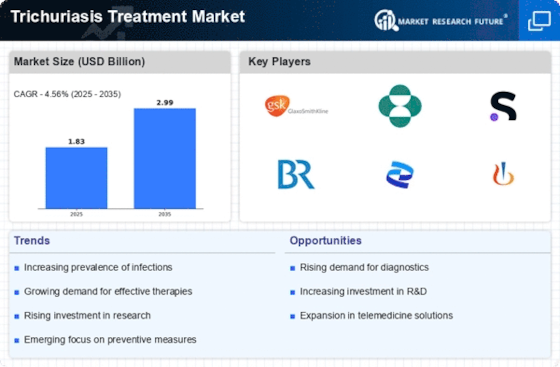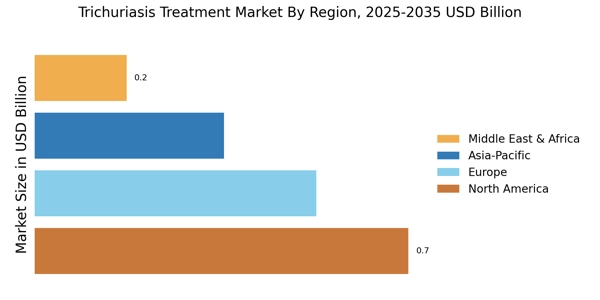Government Initiatives and Funding
Government initiatives aimed at controlling parasitic infections, including trichuriasis, are likely to bolster the Trichuriasis Treatment Market. Various health authorities have implemented programs to enhance disease surveillance, improve sanitation, and promote public health education. Funding allocated for research and development of new treatment modalities is also on the rise. For instance, several countries have launched campaigns to distribute anti-parasitic medications, which could lead to increased accessibility and affordability of treatments. This proactive approach by governments may result in a more robust market environment, encouraging pharmaceutical companies to invest in the development of innovative therapies for trichuriasis.
Increasing Prevalence of Trichuriasis
The rising incidence of trichuriasis, particularly in regions with inadequate sanitation, appears to be a primary driver for the Trichuriasis Treatment Market. According to health reports, millions are affected by this parasitic infection, leading to significant morbidity. The World Health Organization estimates that trichuriasis affects over 600 million people worldwide, with a notable concentration in tropical and subtropical areas. This growing prevalence necessitates effective treatment options, thereby propelling market growth. As awareness of the disease increases, healthcare providers are likely to seek innovative therapies to address the needs of affected populations. Consequently, the demand for effective treatment solutions is expected to rise, further stimulating the Trichuriasis Treatment Market.
Rising Demand for Antiparasitic Drugs
The growing demand for antiparasitic drugs is a significant factor influencing the Trichuriasis Treatment Market. As healthcare systems evolve, there is an increasing focus on effective pharmacological interventions to combat parasitic infections. The market for antiparasitic medications is projected to expand, driven by the need for effective treatment options. Recent data indicates that The Trichuriasis Treatment Market is expected to reach several billion dollars by the end of the decade. This trend suggests that pharmaceutical companies are likely to prioritize research and development efforts in this area, leading to the introduction of novel therapies specifically targeting trichuriasis.
Growing Focus on Preventive Healthcare
The increasing emphasis on preventive healthcare is likely to impact the Trichuriasis Treatment Market positively. Public health campaigns aimed at educating communities about hygiene and sanitation practices are becoming more prevalent. These initiatives not only aim to reduce the incidence of trichuriasis but also promote the importance of early treatment. As awareness grows, individuals are more likely to seek medical attention for symptoms associated with trichuriasis, thereby driving demand for effective treatment options. This focus on prevention and early intervention may lead to a more proactive approach in managing parasitic infections, ultimately benefiting the Trichuriasis Treatment Market.
Technological Advancements in Diagnostics
Technological advancements in diagnostic methods are poised to enhance the Trichuriasis Treatment Market. Improved diagnostic tools, such as molecular techniques and rapid antigen tests, facilitate early detection of trichuriasis, which is crucial for effective treatment. The integration of advanced diagnostic technologies can lead to better patient outcomes and more targeted treatment strategies. As healthcare providers increasingly adopt these innovations, the demand for effective treatment options is likely to rise. This shift towards precision medicine may also encourage pharmaceutical companies to develop tailored therapies, thereby expanding the market for trichuriasis treatments.

















